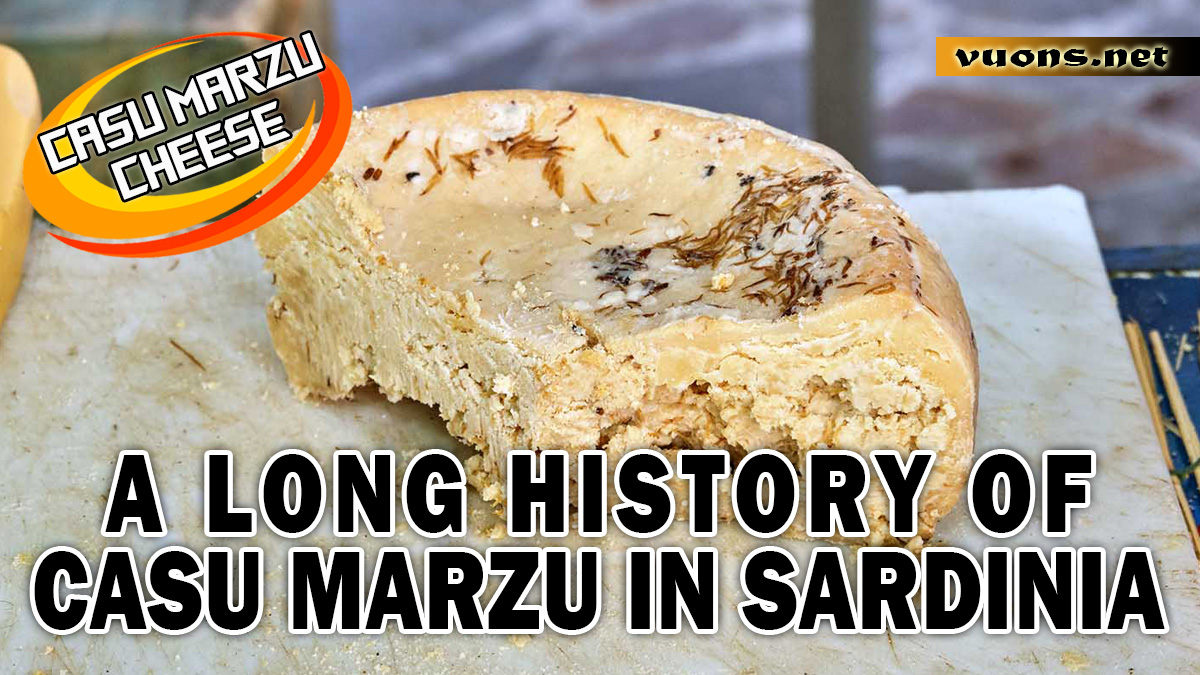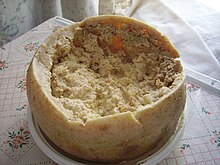Casu Marzu: Sensation of Live Larvae in Every Bite
Long History of Casu Marzu in Sardinia
Casu Marzu is a traditional cheese from Sardinia known for its production method involving live larvae. This cheese is made from sheep’s milk and processed in an unusual way, where cheese flies lay their eggs in it, and the larvae that hatch help ferment the cheese. Although known as one of the most extreme cheeses in the world, Casu Marzu has a long history that is closely linked to local Sardinian culture.
The long history of Casu Marzu in Sardinia shows that this cheese has been part of the culinary traditions of the local people for centuries. Initially, pecorino cheese was commonly used as a base ingredient, but over time, fermentation carried out by fly larvae is thought to improve the quality and texture of the cheese, making it creamier and richer in taste. For many locals, this cheese is a symbol of Sardinia’s rich culture and pride.
However, Casu Marzu has been officially banned by the European Union due to health concerns, in particular the risks posed by the consumption of live larvae. However, this does not stop extreme cheese lovers from seeking and enjoying it illegally. This cheese is still available on the black market or through traditional channels in rural areas of Sardinia.
The process of making Casu Marzu requires special expertise to ensure the cheese is properly fermented, making it safe to consume. Larvae that feed on the cheese produce enzymes that break down the fat, creating its characteristic spicy, tangy taste. Despite this cheese’s extreme reputation, for local people, Casu Marzu is part of a valuable culinary heritage and is full of cultural significance.
Unique Casu Marzu Making Process
Casu Marzu, a legendary cheese from Sardinia, is known not only for its extreme taste but also for its very unique manufacturing process. The process begins with pecorino cheese, a traditional cheese made from sheep’s milk, which is left open so cheese flies can lay their eggs inside. After the Piophila casei fly lays its eggs, the hatched larvae feed on the cheese, starting a fermentation stage that is very different from the typical cheese-making process.
The unique process of making Casu Marzu takes place when fly larvae begin to digest the cheese, breaking down the fat in it and turning the usually solid cheese into a softer, almost liquid texture. This fermentation takes place naturally without the addition of any chemicals, only depending on the biological activity of the larvae. The resulting cheese has a sharp, spicy taste and creamy texture, with a very strong aroma.
This cheese is considered ripe when the inside has turned into a soft paste, while the outside remains intact. The larvae inside the cheese are usually still alive when the cheese is served, providing a very unique eating experience. Many people believe that Casu Marzu is best eaten while the larvae are still active, although some prefer to remove them before consumption.
Although this process is unusual, it is an integral part of the Sardinian culinary tradition and is carried out with skills that have been passed down from generation to generation. This natural fermentation process produces a distinctive taste and texture, making Casu Marzu a highly sought after cheese for those who dare to try a truly different culinary experience.
Fly Larvae: The Key to Natural Fermentation of Casu Marzu
Casu Marzu is a typical Sardinian cheese known for its fermentation process involving live fly larvae. These larvae, of the species Piophila casei, play an important role in creating a very unique and controversial cheese. The uniqueness of this cheese lies in the unusual natural fermentation, which occurs thanks to the biological activity of larvae in the cheese.
Fly Larvae: Casu Marzu’s Natural Fermentation Key makes this cheese different from other cheeses. When flies lay eggs in pecorino cheese, the eggs hatch into larvae that begin to digest the cheese. These larvae break down the fat in the cheese, breaking down its solid structure and creating a softer, almost liquid texture. This natural fermentation produces a cheese with a distinctive tangy, spicy taste and creamy texture, very different from ordinary pecorino cheese.
The larvae also play a role in creating the strong aroma that makes Casu Marzu even more extreme in the eyes of culinary lovers. The larvae’s digestion process of the cheese fat creates enzymes that enrich the taste and aroma of the cheese, providing a unique culinary experience. Although the larvae are often still alive when the cheese is served, many believe that their presence is a sign that the cheese is still fresh and in its best condition for consumption.
Although this cheese was banned by the European Union due to its potential risks, Casu Marzu remains part of Sardinia’s culinary heritage. The fermentation that occurs through the natural interaction between the cheese and the larvae makes it one of the world’s strangest and most interesting Foods, illustrating the way tradition and nature work together to create something unique.
The Controversy and Don’ts Behind Casu Marzu
Casu Marzu, an iconic cheese from Sardinia, is not only known for its unique manufacturing process but also for the controversy that accompanies it. This cheese is made using live fly larvae, which triggers natural fermentation and changes the texture of the cheese to a softer one. However, it is the presence of live larvae that has sparked health concerns and controversy in many countries.
The controversy and prohibition behind Casu Marzu began when the European Union issued a ban on the production and sale of this cheese. The ban arises due to potential health risks, such as infection due to consumption of live larvae and possible contamination during fermentation processes that are not strictly controlled. This cheese is considered not to meet modern food hygiene standards, so it is officially prohibited from being sold on the market.
Nevertheless, for the people of Sardinia, Casu Marzu is an inseparable part of their culinary and cultural traditions. Many local residents continue to produce and consume this cheese informally, even though it is legally prohibited. In fact, some extreme culinary lovers from outside Sardinia are willing to search for Casu Marzu illegally because of its uniqueness which is difficult to find elsewhere.
The ban imposed by the European Union has actually increased Casu Marzu’s appeal among those who enjoy culinary challenges. This cheese is often considered a symbol of rebellion against modern food standards and respect for centuries-old local traditions. For many people, Casu Marzu is not just a meal, but also a representation of Sardinian’s colorful culture and identity.




